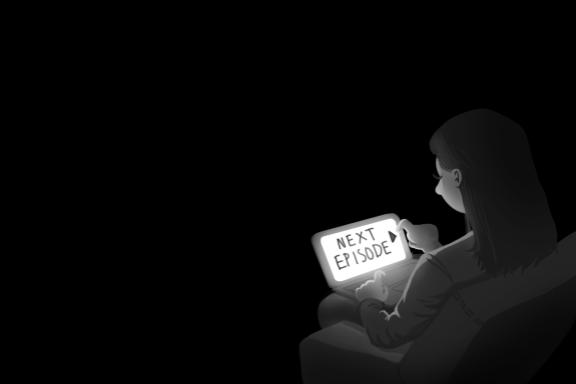From dopamine hits to cliffhangers crafted by emotional sadists — here’s why your “one episode before bed” turns into you watching the sunrise with eye bags and zero regrets.

We’ve all done it.
You open Netflix (JioHotstar, Prime, or that sketchy website you don’t tell anyone about), swear you’ll stop after just one episode… and the next thing you know, the credits roll on Season 3 and you’re Googling the cast’s real-life zodiac signs.
But why?
Why can’t we stop at one?
This isn’t just a lazy habit. It’s neuroscience, storytelling psychology, and a touch of emotional manipulation wrapped in good lighting and background scores.
1. The Dopamine Dilemma: Your Brain Is Addicted to “Next”
When you binge-watch, your brain gets hits of dopamine — the feel-good chemical linked to reward, pleasure, and anticipation.
👉 Think of it like your brain going:
“Wow, this feels amazing. Let’s do that again. And again. And again.”
📊 A study by Netflix (yes, they studied their power) revealed that 61% of users regularly binge-watch, with 73% feeling “good” about it afterwards.
This proves two things:
1. You’re not alone.
2. Your brain low-key treats binge-watching like falling in love… minus the heartbreak (unless they kill off your favourite character).
2. Cliffhangers Are Legal Psychological Weapons
Writers are evil geniuses.
They use something called the “Zeigarnik Effect” — a psychological phenomenon where people remember unfinished tasks better than completed ones.
So when an episode ends with a car crash, a secret reveal, or a “To Be Continued”… your brain is like:
“I have to know what happens next. Sleep can wait. Deadlines can wait. My future can wait.”
That’s not your lack of willpower — that’s neuro-hacking.
3. Mirror Neurons: Why You’re Emotionally Attached to Fake People
Do you ever cry over a fictional breakup like it was your own?
That’s your mirror neurons in action — the parts of your brain that fire when you see someone else feel something even if they’re not real.
Your brain doesn’t know the difference between your pain and Ross not being able to make it work with Rachel for the fifth time.
👉 This builds parasocial relationships — one-sided emotional bonds with characters.
So you keep watching because:
You care. You’re emotionally invested.
And lowkey, you’re now part of the friend group.
4. Instant Gratification: The Streaming Trap
Back in the day, we waited a whole week for the next episode. (Ancient times, I know.)
Now, we click and consume like we’re loading snacks into our brains.
📈 According to a 2017 study by the University of Toledo, binge-watching is linked to poor sleep quality and higher stress levels — yet people do it anyway because the instant reward feels better than long-term control.
Your logic: “I’ll just be tired tomorrow.”
Also your logic: plays the next episode while brushing your teeth at 2 AM.
5. The Loop of Escapism: Life’s Hard, Netflix is Easier
Let’s be honest: sometimes you binge not out of love, but avoidance.
Of deadlines. Of anxiety. Of overthinking everything you said in a text 4 days ago.
📊 A survey by Frontiers in Psychology found that many people binge-watch to regulate mood or avoid negative thoughts — classic escapism.
So yeah, binging is part therapy, part chaos. And we respect it.
6. The Endless Scroll: You’re Never Really Done
Streaming platforms auto-play the next episode before you even have time to reconsider your life.
Some don’t even show credits anymore.
That’s intentional.
It reduces “exit points” — the moments where you might choose to stop.
The goal?
Keep you watching. Keep you hooked. Keep you subscribed.

Conclusion:
Binge-watching isn’t just about shows.
It’s a perfect storm of neuroscience, emotional manipulation, and digital design — all wired to keep us watching.
So the next time you say “Just one episode”…
Just know: your brain’s not lying — it’s just being hacked.
And hey — if you’re gonna binge, at least make it intentional.
(Or watch the whole thing guilt-free. We won’t judge.)
